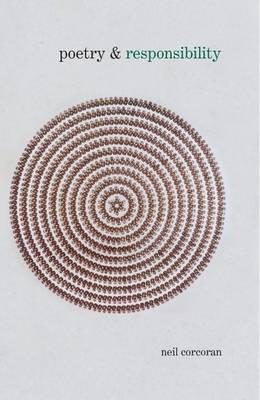Poetry and Lup
1 total work
This study by Neil Corcoran considers the kinds of responsibility which some exemplary modern lyric poetry takes on, or to which it makes itself subject - social, cultural, political, aesthetic and personal. It treats its theme in British, Irish and American poets and in some influential foreign-language poets available in influential English translations.
The book discusses the poetry of the First World War and the Cold War in such poets as Owen, Rosenberg, Pasternak, Zbigniew Herbert and Robert Lowell; the poetry and politics of modern Ireland in Yeats, MacNeice, Heaney and others; and poetry's relations with prose, painting and song in poets including Frank O'Hara, Ted Hughes and Bob Dylan. It focuses particularly on forms of modern elegy.
Poetry & Responsibility includes such topics as the conflicting impulses in Owen between his obligations as a soldier and as a poet; Yeats's gradual creation of one of his greatest poems out of his responsibilities as an Irish schools inspector; Heaney's requirement that poetry make an 'apology' for itself; O'Hara's deployment of a camp sensibility in the interests of writing a politics of 1950s Black American culture; Herbert's rewriting of Hamlet as a reading of Warsaw Pact Poland; and the political and aesthetic significance of Dylan's restless self-revision.
The book argues that exemplary modern lyric poetry can be shown to resist various forms of accommodation or appropriation. In its strategies of opposition, it becomes what Auden calls it in his elegy for Yeats: 'A way of happening, a mouth.'
The book discusses the poetry of the First World War and the Cold War in such poets as Owen, Rosenberg, Pasternak, Zbigniew Herbert and Robert Lowell; the poetry and politics of modern Ireland in Yeats, MacNeice, Heaney and others; and poetry's relations with prose, painting and song in poets including Frank O'Hara, Ted Hughes and Bob Dylan. It focuses particularly on forms of modern elegy.
Poetry & Responsibility includes such topics as the conflicting impulses in Owen between his obligations as a soldier and as a poet; Yeats's gradual creation of one of his greatest poems out of his responsibilities as an Irish schools inspector; Heaney's requirement that poetry make an 'apology' for itself; O'Hara's deployment of a camp sensibility in the interests of writing a politics of 1950s Black American culture; Herbert's rewriting of Hamlet as a reading of Warsaw Pact Poland; and the political and aesthetic significance of Dylan's restless self-revision.
The book argues that exemplary modern lyric poetry can be shown to resist various forms of accommodation or appropriation. In its strategies of opposition, it becomes what Auden calls it in his elegy for Yeats: 'A way of happening, a mouth.'
